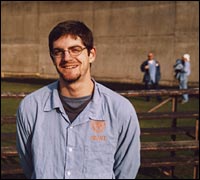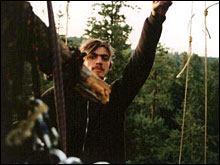In 2000, 21-year-old Jeff Luers and an accomplice set fire to three pickup trucks at a dealership in Eugene, Ore., to bring attention to gas-guzzlers’ contribution to global warming. They were promptly arrested. Luers, who refused to plea bargain, was sentenced to 22 years, eight months in prison. It is the longest term ever handed down for environmentally motivated sabotage in America — and far longer than sentences given to arsonists in Oregon who have destroyed more property and endangered peoples’ lives.
But Luers’ sentence may be surpassed if any of the upcoming trials of 11 people arrested in January for eco-motivated arson and vandalism yield convictions. Though Luers’ crime was minor by comparison, his case serves as a precedent: the fact that one of those arrested, Daniel McGowan, used to run a website for Luers was raised in an attempt to deny McGowan bail.
Because Luers is already in prison and knows he is under total surveillance, he is willing to speak his mind on eco-sabotage as few others are. He regularly issues communiqués from prison through a website maintained by outside supporters, and co-published Heartcheck in 2005, a prison zine that sounds a call for unflinchingly hands-on eco-revolution.
But Luers’ ability to communicate more widely with the outside world has been hampered by the authorities. He has been classified as a member of a “security threat group” — a measure designed to disrupt gangs, but applied in Luers’ case to his anarchist and environmental affiliations. Restrictions on his communications have frustrated many reporters, but Grist was able to interview Luers over the phone from Oregon State Penitentiary — the first interview he’s given in nearly a year.
How do the latest arrests change the landscape for radical action?
This is pretty much the make-or-break point for the radical ecological movement in this country. A lot of people are scared and intimidated right now. They’re either going to fall apart, or they’re going to come together and show that, no matter how many arrests are made or how hard the government tries to crack down on dissent, the people aren’t going to be quiet. That’s what people need to do: whether or not they support radical action, they can’t be intimidated into silence.
Did your conviction serve as the deterrent it was apparently intended to be?
Unfortunately, yeah, I think it has — particularly in the local community that I got arrested out of. There’s been a noticeable decline in underground activities, and part of that is the harsh sentence I received. But I think part of that is also the fact that we had a lot of people who put their hopes into easy solutions. It looked like it was going to work for a while: there was a huge galvanization of the public after [the WTO protests] in Seattle in ’99. But the actions stopped. There was a lot of pressure from the police forces on separating unions and radical activists, and everything just kind of collapsed.
Coming out of that period, “eco-terrorism” was identified by the federal government as one of the biggest threats to the nation, right alongside things like al Qaeda. Did you consider yourself engaged in terrorism when you burned those trucks?
If someone believes I’m a terrorist, I don’t think there’s anything I’m going to say that’s going to change their mind. When you look at the use of the word today, “terrorism” is basically a way to define armed struggles you disagree with.
What is it that you are struggling for?
The biggest thing I’m trying to achieve is a change in social conscience. Our society operates under an extreme capitalist system that is completely unsustainable. You can’t take a limited amount of resources and exploit it infinitely and expect it to continue to yield the same results year after year.
I think we’re finally starting to realize that: we’ve got climate change, our oil’s starting to run out, our forests are disappearing. But the thing that bothers me is that technologies exist to create a greener lifestyle and they’re not being implemented. In part it’s because big companies don’t see a profit in them, but it’s also because consumers don’t demand it.
When I think about the people who are out there sitting in their SUVs and sitting in front of their TVs and just consuming, consuming, consuming, it seems to me that most of them aren’t doing it because they are evil and trying to consciously destroy the earth. It’s just that they’re not thinking about how they’re living.
Though they may share some of your goals, a lot of environmentalists are committed to nonviolent change, and would certainly disagree with your tactics. What do you think of their tactics?
We need groups like the Sierra Club; we need people who believe in support and reform. But at the same time, I think that we need people like me who are willing and able to get our hands dirty.
Any individual that cares enough to act knows whether or not they can take that extra step. Everyone has a level of commitment they can make, whether that’s taking more mass transit, or riding your bike one day a week, or not using a vehicle at all. You can organize a boycott of the biggest local polluter. If you’re already an activist, you can up the scale of what you’re doing and get more involved in civil disobedience. Or you can go with other, extralegal activities.
And that, of course, is the route that landed you in prison.
That is the route that landed me in prison. So I advise people to use caution.
Was the truck-burning action you were convicted for the most extreme thing you’d done?
Yeah, I’d say it was. I was trying to move into the realm of more radical actions. This was one that I felt was not only symbolic in nature but allowed me to take that baby step. I was working toward being more of an underground guerilla activist.
Did you consider yourself a member of the Earth Liberation Front?
No. It might just be my political ideology, but I have a hard time identifying with any organization. While I strongly support what the ELF does, and I definitely can identify with their tactics and reasons why they use them, any person in the United States who claims ELF in any action automatically opens themselves up to investigation by the FBI.
As we’ve seen recently, the bar isn’t even that high: people are being investigated based on what they eat or drive, for example. Because a lot of mainstream environmentalists share overarching goals with people like you, isn’t there a danger that these acts of eco-sabotage are just giving mainstream environmentalism a bad name?
No. When you’ve got groups like ELF out there burning things down, it makes aboveground activism look tame. Because of that, the general public knows it’s asinine when Greenpeace gets charged with piracy for boarding a ship and hanging a banner.
In Heartcheck, you write things like, “Smash it. Break it. Block it. Lock it down. I don’t care why you do it or how you do it but stop it. Get out there and stop it.” It sounds like you’re not repentant.
I’m not. Social change is never a strictly peaceful thing. I simply don’t think that you’re going to see any type of true social change in this country without a show of force from the people, whether that comes in the form of millions of people marching in the streets or in the form of a few thousand out there committing acts of sabotage.
Political direct action today is following in the footsteps of the noble acts of social rebellion for human liberation that have always occurred in this country: things like the Boston Tea Party, the Underground Railroad, the Suffragettes, and the civil-rights movement.
You write that many activists are “stuck in a stagnant cycle,” and can’t get “outside the box of activism.” What are you referring to?
In this country, protest is basically a relief valve for public stress. Great examples of that now are the designated protest zones miles away from the actual thing that people are protesting. It’s built into the social equation now that if you give people an outlet, they won’t take things further and actually threaten the status quo. So when I say, “thinking outside the box,” I mean exactly that: if you’re doing something that the group you’re protesting is actually allowing you to do, then it’s probably not very effective.
In the same zine, you also wrote “it’s a beautiful thing to see the financial district of a major city smashed to pieces.” Of course we saw that in New York — was that a beautiful thing?
That’s a tough one. From a militant standpoint it’s sad, but I’m not going to say that it was entirely wrong. I have friends who witnessed 9/11 and I have friends that lost family. I hate to see loss of life, period. And yet, I can understand how the World Trade Center is a legitimate target in this country. The U.S. economy is a trade economy, and when you’re striking out and trying to cripple a country, you go after what it is that makes that country operate.
Some eco-tage actions have been pretty major, and could conceivably kill people who happened to be in the wrong place at the wrong time. In your view, would that be justifiable collateral damage?
If you’re looking at actions like burning cars, then no, injuring someone is not justifiable collateral damage. People are taking a lot of caution. We’ve seen relatively few injuries in any of these types of actions, and those that have occurred are generally the people committing the actions themselves. I don’t think that it’s just a matter of time before a bystander is injured through property destruction — those groups have a track record of nearly four decades of underground illegal direct action that’s involved all kinds of sabotage, and we haven’t seen a single injury.
But then again, I wouldn’t be opposed to physical violence against a human being if it was necessary.
You’re advocating violent social change, but your ultimate goal is to have a peaceful, sustainable society. How can a violent path lead to peace?
It’s hard. You know, I ain’t gonna deny that. But I don’t think that an entirely passive resistance in this country could be successful. I don’t think the government would allow it, frankly — it would be quashed through force of arms.
But if people are too dispirited to even keep doing the level of actions that you mentioned in Eugene, how are they going to do something like band together and rise up in armed struggle?
I don’t know. That’s why I write about it. If I had solutions, believe me, I would have them all over the place whether people wanted to hear them or not. I don’t. All I know is that things are very, very wrong and I’m willing to work in a myriad of ways to try to fix them.
My greatest success is in simply trying to inspire people. Out of all the people that have read anything I’ve written or heard any interview I’ve done, maybe .001 percent have actually gotten involved in illegal direct action. But I’ve gotten a lot of people to start recycling, or to write their representatives. And to me that’s huge. If I can get just a handful of people that never cared about anything to suddenly care and want to do something no matter how small, then maybe they’ll get a handful of people to do the same thing. It has to start somewhere.
But couldn’t you have accomplished just as much above ground instead of going to jail? Do you think you would have had the same impact?
I don’t really know, to be honest. I’m a militant, flat out. When I was 16, I aspired to be a militant, as strange as that sounds. I enjoyed being a militant. I enjoyed the civil disobedience that I did, probably in much the same way that people who become soldiers enjoy what they do. I obviously didn’t fill that niche very well because I ended up in prison doing it, so perhaps there were better alternatives for me.
When I did this I was a young kid, just turned 21. I went out, did a pretty small little action and got hammered with 22 years. But I have continued to be passionate about why I did what I did, and I think that resonates with people. People want to root for the underdog, and I’m the underdog: the things that I’m struggling for are so utopian they seem almost ridiculous. Yet people want a fraction of that idealism in their lives.




